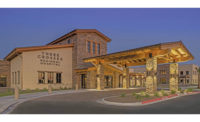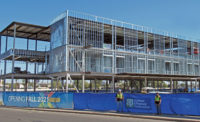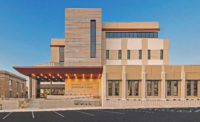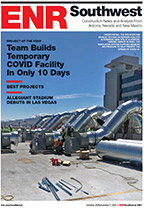AECOM Out as Lead Firm On $1.66B MSG Sphere
Developers of the $1.66-billion MSG Sphere in Las Vegas have removed AECOM as general contractor on the project and will bring construction management in-house for the 875,000-sq-ft entertainment venue, according to a Madison Square Garden Entertainment Corp. statement released Dec. 17.
The company offered no reason for the change.
An MSG Entertainment executive who declined to be identified reiterated points in the company’s announcement about the action, saying it reflects a strengthening of an internal team that’s ready to take direct control of the project while AECOM remains in the picture to provide support.
AECOM said in a statement: “Our relationship with MSG Entertainment remains strong, and we’re proud of our ongoing involvement to help deliver this transformational project.”
Neither company would elaborate or allow executives to comment on the record.
When complete, the MSG Sphere will be the world’s largest spherical structure, at 360 ft high, with cutting-edge audio and video technology for concerts and other events. AECOM, a multinational engineering and construction management company, was brought on board as general contractor in June 2019.
Leadership Continuity
MSG executive Jayne McGivern will continue to lead the project through her new role as president of development and construction. “We have taken significant steps to strengthen our internal construction team,” McGivern said. “This, along with valued support from AECOM, will give us greater transparency and control over the construction process while enabling us to continue benefiting from AECOM’s expertise.”
AECOM will remain involved in a supporting role through projected completion in 2023, the statement said, without providing additional details. About 30 AECOM employees will stay on the job, managed by MSG Entertainment.
Construction on the 17,500-seat arena reached its 516-ft “equator” in spring, shortly before stopping because of the pandemic. Construction has since resumed, with MSG Entertainment reporting 450 tradespeople working on site, primarily focused on superstructure, concrete and structural steel erection. MSG touts recent completion of the venue’s sixth-level, 490-ft-wide concrete ring beam, which sits 113 ft above ground level, and placement of two 240-ton steel girders.
Upcoming critical path work includes completing stair and elevator cores and the venue’s proscenium wall. After that, steel for the remaining exterior ring beams and inboard decks will be placed, then construction of the steel domed roof will begin in early 2021. The original 2021 completion date was pushed back two years when work resumed this summer.
Rolling Stone magazine has called the MSG Sphere “the insane concert venue of the future,” with its giant LED video displays placed above the audience, behind the stage and as part of the building’s exterior.
The MSG Sphere is going up on 18 acres just east of the Strip and will be attached to the Venetian resort with a 1,000-ft-long pedestrian bridge. Billionaire Sheldon Adelson’s Las Vegas Sands, owner of the Venetian and neighboring Palazzo resorts, is a project partner and is leasing land to the arena.
By Doug Puppel
New ASU Arena Ready To Begin Construction
Arizona State University says it is ready to begin construction on a multipurpose arena that will host university and community events and serve as the future home for Sun Devils men’s ice hockey and wrestling and women’s gymnastics. The 5,000-seat venue is part of the development of the Novus Innovation Corridor and will be sited south of Rio Salado Parkway. The arena is designed by SCI Architects, while Mortenson Construction will serve as design builder.
In addition to housing Sun Devils events and athletic competitions, the arena, which also includes an adjacent community ice rink, will serve as a public venue to host concerts, conferences, youth competitions, educational opportunities and more. The second full-size ice sheet will be accessible to students and the community.
The seating configuration for the arena includes 20 luxury suites, two group suites, a large club lounge and event-level premium club seats. The club lounge will consist of a Center Ice Club on the main concourse that can host up to 500 fans. On the 300 level, a social deck will run the length of the east side. A 942-seat student section will occupy the entire west side of the venue to provide an enhanced gameday experience for ASU students. Construction is scheduled to begin in January, with full completion projected for December 2022.
Sunstate’s Trench Safety Division Acquires Firms
Sunstate Equipment Co. LLC says it plans to acquire Cascade Shoring LLC and Cascade Trench Safety LLC in the Pacific Northwest. Cascade’s business entities include branches in Portland, Ore., and Seattle.
The acquisition marks the entry of Sunstate Equipment’s Trench Safety Division into the Pacific Northwest, where the firm has seen rapid growth for its general rental operations since opening its first regional branch in Portland in 2018. Since then, Sunstate has added general rental locations in Kent, Lakewood and Woodinville, Wash.
Sunstate’s growth in the Northwest has mirrored similar growth into new markets in the Southeast states of Georgia, Florida and North Carolina during the same two-year period. In 2019 Sunstate also entered the specialized services niche of underground and confined space safety with the addition of its Trench Safety Division, which currently operates in Georgia, Oklahoma and Texas.
ADOT Chooses Developer For I-10 Project in Phoenix
The Arizona Dept. of Transportation has selected a preferred developer to reconstruct part of Interstate 10 in Phoenix identified as a key commerce corridor. ADOT announced a joint venture team of Pulice Construction Inc., FNF Construction Inc., Flatiron Constructors and T.Y. Lin will be the preferred developer for the Broadway Curve Improvement Project.
The objective is to improve an 11-mile stretch of I-10 that runs between I-17 and state Route 202. Located southeast of downtown Phoenix, the project zone stretches from the Salt River to Chandler and encompasses Tempe and Guadalupe. ADOT, city representatives of Phoenix and Tempe, and the Maricopa Association of Governments were involved in the decision about the developer.
Proposed improvements include widening I-10 to six general-purpose lanes and two high-occupancy vehicle lanes and building a collector-distributor road system to separate local and through traffic. The project also will include modifying I-10’s connections with state Route 143, Broadway Road and U.S. Route 60 as well as adding three pedestrian bridges to connect communities.
ADOT estimates about 300,000 vehicles travel through I-10’s Broadway Curve corridor on a weekday. By 2040, that figure is expected to increase to 375,000.
“This project will improve safety and efficiency for hundreds of thousands of drivers who travel through the Broadway Curve each weekday and generate $658 million in new economic activity,” said Phoenix Mayor Kate Gallego.






